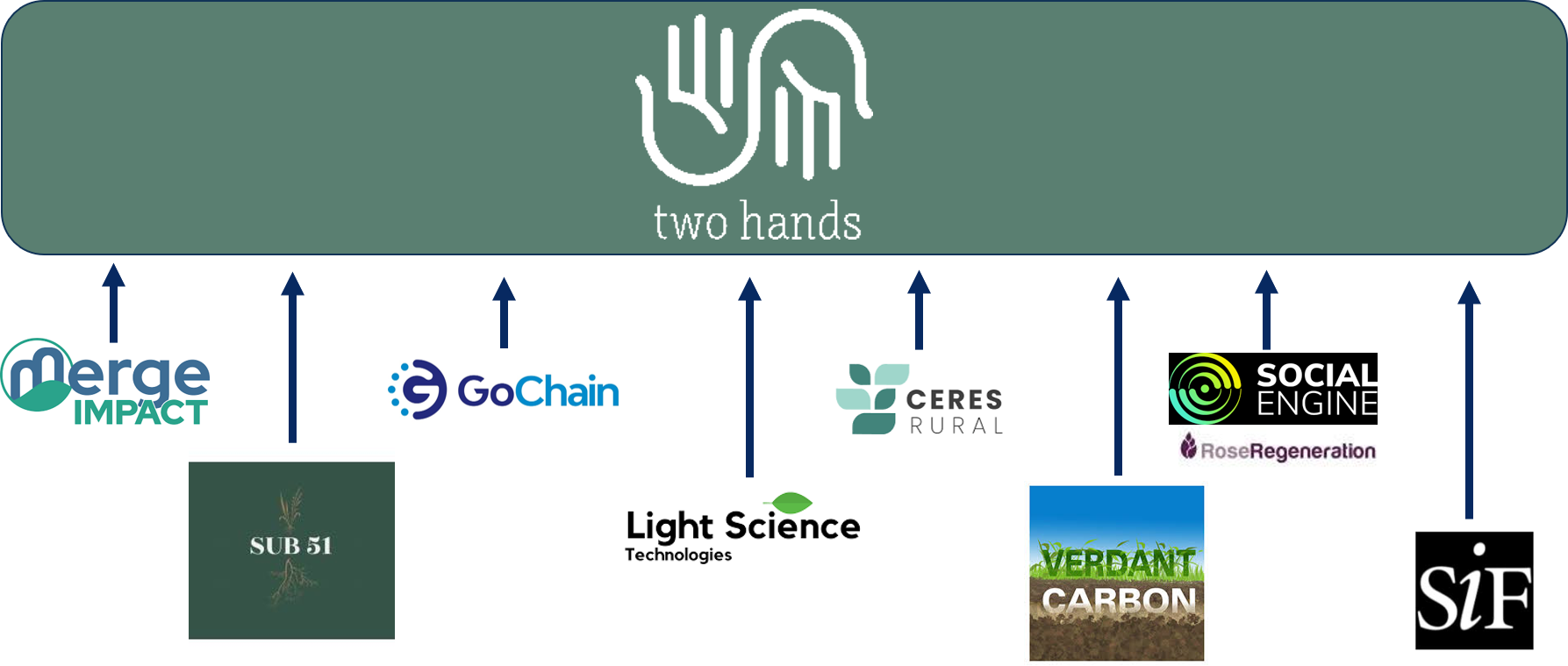Launching a World-First in Sustainability
The Two Hands digital trust platform creates the opportunity to address the UK's net zero goals. Based on the outstanding ARCZERO results, Two Hands is collaborating with 6 agri-techs to measure, report and financially-incentivise farmers to improve their environmental impact. Foodservice users will receive regulatory-compliant ESG reporting based on authenticated data from the source. Carbon & biodiversity markets will receive authenticated, farm-level data to invest in - greenwashing is eliminated. No need for government subsidies to drive net zero.
The ARCZero Experience

An EU-funded research project among seven commercial farms in Northern Ireland, ARCZero was designed to forensically measure the impact of farming on net zero and GHGe and then assist the farms in improving their impact.
After 10 years, the research confirms that all 7 farms, including 5 with livestock, will deliver beyond net zero by 2030.
With 70% of UK land devoted to farming, replicating the ARCZERO results here have the potential to meet the UK's net zero targets. The challenge is how to execute without relying on already-limited government funding.
A Collaborative Solution

- Lobsters are caught, tagged and sealed in ‘pots’ on the ship.
- The lobsters are then transported to the port in sealed containers.
- The lobsters are then transported to the processor facility.
- The lobsters are weighed and put into a tank with local seawater to purge. This prepares the lobsters for transit, reducing stress and mortality. The purging takes place for 36 - 48 hours in Australian sea water.
- The lobsters are weighed, packed into a box and transported to the airport in a temperature-controlled container.
- The freight forwarder ensures that the lobsters are available for any customs inspections.
- The lobsters are then transported by air to China in a cold storage container.
- The logistics team accompanies the lobsters after clearing Chinese customs and the duty, tariffs and VAT are paid.
- The lobsters are then transported directly from the airport to the restaurant.
- The restaurant receives the lobsters and stores them in a controlled environment.
- The lobster is prepared and served to the diner.
The digital trust technology and re-engineered supply chain underpinning the Two Hands platform allows for other tech to bolt on. At each farm, our agri-tech partners measure, verify and report the environmental data using cutting-edge real-time data, which Two Hands, not the farmers, pays for. This data is then incorporated into the authenticated data attached to each product sold through our marketplace. Two Hands also organises for regenerative farm plans to be designed by Ceres Rural for each farm.
Farmers have the opportunity to sell their high-quality environmental data as additional income streams (through assistance from our other agritech partners via carbon credits, biodiversity gain credits, ESG reporting data and research/analysis farm-level data), with Two Hands taking a small portion to cover their costs. Farmers also receive an above-market price from Two Hands for their produce.
The granular farm data on biodiversity, GHGe, water quality, soil quality, animal welfare and worker welfare is transparently, immutably attached to each food portion sold or aggregated through our Digital Trust Technology, to provide end users with trust, not greenwashing.
Through this collaborative approach, everyone wins - farmers, the community, chefs, the environment.
Fighting Food Fraud
Existing supply chains are opaque, middlemen pocket up to 60% of earnings.
Two Hands has re-engineered the supply chain from the ground up to put people at the centre. Transparency is key. What you do on Two Hands today, will affect who wants to do business with you tomorrow. Trust is confident vulnerability. Two Hands fosters trust by enabling everyone to see, who does what they say they will.
When buying from a local fish market it is impossible to know:
How many wholesale facilities did it pass through?
What temperature was the lobster stored at each facility?
What was the quality of the water in each facility?
How many times has the animal been handled?
Where was it caught?
Was the animal miss treated?
How long ago was the animal caught?
“Food fraud represents a USD 40 billion problem worldwide and is allegedly worth
more than the heroin trade and firearms trafficking combined”
- Dr Sylvain Charlebois, Professor in Food Distribution and Policy, Dalhousie University, Canada
EARNED TRUST
Why Use Blockchain?
Instead of “trust, but verify”, blockchain enables us to “verify, then trust”. A centralised system is susceptible to abuse. If a business can pay to remove content that is bad for business, how can the system be trusted? How can they be transparent when their supply chain operate in data silos? In a decentralised system there is no one to pay. Everyone can see if your deliveries are late, or you don’t pay your bills on time or you sell low quality product.
In the Two Hands model, a last mile distributor operating a node in China has access to every transaction. The distributor can assure their customers of the data integrity with confidence. The distributor has a record of every transaction in their supply chain.
Immutable changes to a tag's data are visible to everyone in the network. The transactions are immutable and require consensus to be added into the ledger. The shared data view makes the supply chain more transparent. Transparency acts as a trust anchor for collaboration between people across continents.
“It means that we will be able to get our product into China in the most pristine condition ever and the Chinese people will be able to experience perfect Southern Rock Lobster, just as they are when we take them out of the water.”
Fishers Colin and Kae Milstead
(Robe, South Australia)



